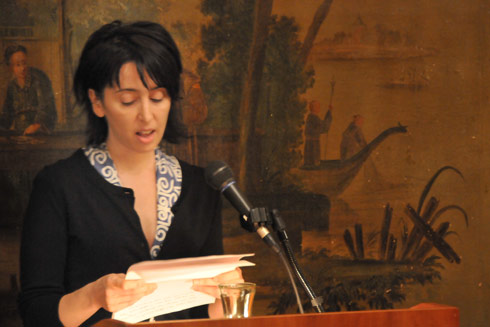 I make a portion of my living helping other people write, rewrite, fix, or otherwise fiddle with their memoirs. Generally speaking, these people are not interested in the Single-I point of view, or the “dispatch from the moment,” or a memoir proceeding entirely in a progression of chronologically linear scenes from the point of view of the person they were at the time of the events they’re offering the reader. The reason is usually a lack of desire for discipline — there are very few tasks more difficult than the task of writing a chronologically linear book in a progression of scenes which are not hijacked by a latter-day narrator who regularly swoops in to essay, explain, make meaning, apologize, or otherwise interrupt the experience the reader is having with the person the narrator used to be. The primary benefit of the Single-I is that it is the closest thing we have in memoir to the simulation of someone else’s experience of life, since life is lived in the moment to moment and offers little in the way of summary, dispatches from the future, and so on. All that comes later, when we impose narrative on past events. Narrative is one of my favorite things, but it is, let’s remember, a fundamentally artificial thing, different in almost every way from the actual experience of living life. All the boring stuff is cut out, all the everyday stuff is cut out, all the sleeping, most of the eating and pissing and pooping, most of the banalities of conversation, etc. (I should note here that the exception that points back to this rule is the craftsmanly recent fiction of Tao Lin, whose last two novels are very interested in restoring these banalities alongside the discipline of the Single-I, and toward interesting ends including reproduction of a kind of self-centered Americanized young person’s Buddhist-ish consciousness — but that’s not what I want to talk about here.)
I make a portion of my living helping other people write, rewrite, fix, or otherwise fiddle with their memoirs. Generally speaking, these people are not interested in the Single-I point of view, or the “dispatch from the moment,” or a memoir proceeding entirely in a progression of chronologically linear scenes from the point of view of the person they were at the time of the events they’re offering the reader. The reason is usually a lack of desire for discipline — there are very few tasks more difficult than the task of writing a chronologically linear book in a progression of scenes which are not hijacked by a latter-day narrator who regularly swoops in to essay, explain, make meaning, apologize, or otherwise interrupt the experience the reader is having with the person the narrator used to be. The primary benefit of the Single-I is that it is the closest thing we have in memoir to the simulation of someone else’s experience of life, since life is lived in the moment to moment and offers little in the way of summary, dispatches from the future, and so on. All that comes later, when we impose narrative on past events. Narrative is one of my favorite things, but it is, let’s remember, a fundamentally artificial thing, different in almost every way from the actual experience of living life. All the boring stuff is cut out, all the everyday stuff is cut out, all the sleeping, most of the eating and pissing and pooping, most of the banalities of conversation, etc. (I should note here that the exception that points back to this rule is the craftsmanly recent fiction of Tao Lin, whose last two novels are very interested in restoring these banalities alongside the discipline of the Single-I, and toward interesting ends including reproduction of a kind of self-centered Americanized young person’s Buddhist-ish consciousness — but that’s not what I want to talk about here.)
What I want to talk about is a brief passage from Deb Olin Unferth’s new memoir Revolution: The Year I Fell in Love and Went to Join the War, a book that decidedly rejects the Single-I point of view in favor of the much more popular alternative, the Double-I. (This terminology is not standard, by the way. I borrow it from my old teacher Lee K. Abbott. I have found it very useful for descriptive reasons, so I’m going to keep using it.) READ MORE >






 I make a portion of my living helping other people write, rewrite, fix, or otherwise fiddle with their memoirs. Generally speaking, these people are not interested in the Single-I point of view, or the “dispatch from the moment,” or a memoir proceeding entirely in a progression of chronologically linear scenes from the point of view of the person they were at the time of the events they’re offering the reader. The reason is usually a lack of desire for discipline — there are very few tasks more difficult than the task of writing a chronologically linear book in a progression of scenes which are not hijacked by a latter-day narrator who regularly swoops in to essay, explain, make meaning, apologize, or otherwise interrupt the experience the reader is having with the person the narrator used to be. The primary benefit of the Single-I is that it is the closest thing we have in memoir to the simulation of someone else’s experience of life, since life is lived in the moment to moment and offers little in the way of summary, dispatches from the future, and so on. All that comes later, when we impose narrative on past events. Narrative is one of my favorite things, but it is, let’s remember, a fundamentally artificial thing, different in almost every way from the actual experience of living life. All the boring stuff is cut out, all the everyday stuff is cut out, all the sleeping, most of the eating and pissing and pooping, most of the banalities of conversation, etc. (I should note here that the exception that points back to this rule is the craftsmanly recent fiction of Tao Lin, whose last two novels are very interested in restoring these banalities alongside the discipline of the Single-I, and toward interesting ends including reproduction of a kind of self-centered Americanized young person’s Buddhist-ish consciousness — but that’s not what I want to talk about here.)
I make a portion of my living helping other people write, rewrite, fix, or otherwise fiddle with their memoirs. Generally speaking, these people are not interested in the Single-I point of view, or the “dispatch from the moment,” or a memoir proceeding entirely in a progression of chronologically linear scenes from the point of view of the person they were at the time of the events they’re offering the reader. The reason is usually a lack of desire for discipline — there are very few tasks more difficult than the task of writing a chronologically linear book in a progression of scenes which are not hijacked by a latter-day narrator who regularly swoops in to essay, explain, make meaning, apologize, or otherwise interrupt the experience the reader is having with the person the narrator used to be. The primary benefit of the Single-I is that it is the closest thing we have in memoir to the simulation of someone else’s experience of life, since life is lived in the moment to moment and offers little in the way of summary, dispatches from the future, and so on. All that comes later, when we impose narrative on past events. Narrative is one of my favorite things, but it is, let’s remember, a fundamentally artificial thing, different in almost every way from the actual experience of living life. All the boring stuff is cut out, all the everyday stuff is cut out, all the sleeping, most of the eating and pissing and pooping, most of the banalities of conversation, etc. (I should note here that the exception that points back to this rule is the craftsmanly recent fiction of Tao Lin, whose last two novels are very interested in restoring these banalities alongside the discipline of the Single-I, and toward interesting ends including reproduction of a kind of self-centered Americanized young person’s Buddhist-ish consciousness — but that’s not what I want to talk about here.) This is from Chapter Two, Part 4, of Vladimir Nabokov’s Pnin. The protagonist, immigrant professor Timofey Pnin, has just had all his teeth pulled:
This is from Chapter Two, Part 4, of Vladimir Nabokov’s Pnin. The protagonist, immigrant professor Timofey Pnin, has just had all his teeth pulled: